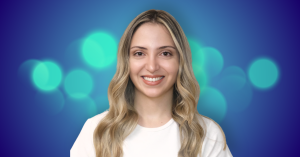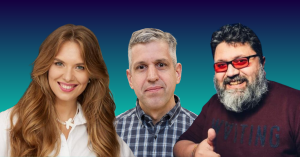Before being a founder, Kyriakos Eleftheriou was a commando in the special forces, a weight lifter, and a runner. He used wearable devices to track his performance during athletic events or when training for the special forces. But he noticed the discrepancy between the measured data and the actual biochemistry education that is taught for so many years. This got him thinking and he started to learn more about the nits and bits of nutrition, physical training, and muscular growth.
That is how Eleftheriou co-founded Terra – an API startup that enables developers to easily access fitness and health data from wearable devices and sensors. A solution that got him into Y Combinator, the American superleague seed money accelerator.
Eleftheriou is the first Greek entrepreneur to join the program, which is a testimony of the importance of the startup that he is developing – an app that is solving the problem of split fitness data and the ensuing poor communication.
A big vision for fitness data unification
With the proliferation of wearable devices and mobile fitness apps that keep track of activity levels, calories, heart rate, hours of sleeping, standing and sitting, the mountains of available health data have created lots of opportunities for innovation in the fitness industry. Application programming interfaces (APIs) are one such area of opportunity, as they enable software engineers to develop apps with greater usability and accuracy. Global brands such as Fitbit and Garmin, Under Armour, and Apple have already set the trends of developing fitness APIs.
Eleftheriou and his co-founder Raouf Yousfi both have a background in engineering and learned how to think from the perspective of engineers. This helped them solve the problems related to fitness tracking and performance optimization.
Every wearable device such as a Fitbit watch is measuring steps, heart rate, or the level of stress in the body, but all of the generated data stays inside the Fitbit account. “Now what if you could give access to Spotify to track that information? Spotify could make so much better song recommendations if they knew your heart,” says the Greek entrepreneur. That is why the startup gives users the freedom to share and connect their generated fitness and biodata with other apps. Given how controversial privacy around biodata is, Eleftheriou points out that Terra is giving people the ability to offer their information to apps and not the other way around.
Ending up in YC after 150 pitches
Eleftheriou remembers that when he began developing Terra, he quickly came to the realization that he needs to raise a good amount of money in order to be able to build an accurate solution. He started going to investors in Cyprus and Greece but had no success. He decided to go to London where he met with around 150 venture capitalists – but again raised no funding. At this point, he thought that if nobody in Europe wants to give him money, he will just go to San Francisco.
“In Europe, we are very pessimistic. So the way we judge an investment is based on evaluating the current market dynamics. Whereas I could see in San Francisco that the question was – does that idea have a potential to unlock a future market,” concludes Eleftheriou.
Through the ecosystem, he also learned about the opportunities that the Y Combinator offered to visionary early-stage founders. He shares that the statistical odds were skewed against him and his co-founder since no Greek or Algerian founder had entered into the program before. The preparation to get in was not easy but the founding team was confident that they could succeed because they knew what the YC was looking for – a scalable business that solves a real-world problem. “ Y Combinator is trying to identify whether the applicants have a good team that is able to deliver impact. What this meant for us was that we needed to prove to them that Terra could become a billion-dollar business which required building the product and getting a lot of customers in an extremely short amount of time,” says Eleftheriou.
The Greek founder highlights that there were four major ways in which the program helped him and his co-founder develop Terra. First, it was the advice that they received from the mentors and founders who were part of the YC network. They were open to sharing their stories and making first-hand recommendations about how to get around failure. Second, Eleftheriou and Yousfi also received exposure to some of the most well-known international investors such as Sequoia. By meeting with startups both at their stage or at a much later stage of development, the founding team of Terra was able to see how little time is needed for a startup to become successful. “This makes you think how you need to catch up – you see a company that is in the same position and is running exceptionally fast. So you get both inspired by them and motivated to outperform them,” explains Eleftheriou. And finally, YC allowed them to initiate conversations with founders of global startups such as Airbnb, Stripe, and Dropbox and help them realize that these successful people were in the same shoes five years ago.
The numbers and technology behind Terra
For the short time of its existence, Terra has signed deals with customers from all around the world. The company is currently working with some of the best international health tech startups from San Francisco and New York, to Greece and Israel. Within three months, they have attracted more than 200,000 users.
Eleftheriou explains that the way they make revenues is similar to Twilio – the developers’ APIs communication platform for channels such as voice, text, chat, and video. “We are an API player, meaning that developers come to speak with us in order for their users to access some permissions, so we are charging for the usage of a product,” clarifies the co-founder of Terra.
Eleftheriou believes that in five years wearables will share real-time data, and have predicting abilities, which will result in the generation of vast amounts of fitness data. Terra will make it easy for fitness and health app developers to access data from those wearables and sensors.
Staying connected to the roots
Eleftheriou shares how he grew up with stories about Zeus and Alexander the Great, so from a philosophical to a leadership standpoint, this helped him to go outside of the comfort zone and get what he wants. He says that there are many Greek founders that he is reaching out for support and advice. But there are also many who are reaching out to him, including founders who are willing to get into the Y Combinator.
“What is missing from the Greek ecosystem for it to flourish is a more open-minded way of thinking and a go-get-it attitude. Greek, and Balkan people in general, are more pessimistic by nature, whereas, in the US, founders and investors are much more optimistic,” highlights Eleftheriou. He points out that the levels of risk aversion versus risk tolerance are crucial for the development of an ecosystem because they determine how people perceive failure.







